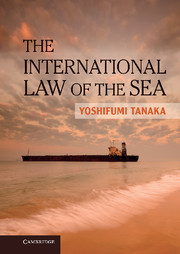Book contents
- Frontmatter
- Contents
- Preface
- Acknowledgements
- Figures
- Tables
- Abbreviations
- Table of Cases
- Table of Treaties and Instruments
- Part I The Divided Oceans: International Law Governing Jurisdictional Zones
- Part II Our Common Ocean: Protection of Community Interests at Sea
- 7 Conservation of Marine Living Resources
- 8 Protection of the Marine Environment
- 9 Conservation of Marine Biological Diversity
- 10 Marine Scientific Research
- 11 Maintenance of International Peace and Security at Sea
- 12 Land-Locked and Geographically Disadvantaged States
- 13 Peaceful Settlement of International Disputes
- Index
- References
7 - Conservation of Marine Living Resources
Main Issues
from Part II - Our Common Ocean: Protection of Community Interests at Sea
- Frontmatter
- Contents
- Preface
- Acknowledgements
- Figures
- Tables
- Abbreviations
- Table of Cases
- Table of Treaties and Instruments
- Part I The Divided Oceans: International Law Governing Jurisdictional Zones
- Part II Our Common Ocean: Protection of Community Interests at Sea
- 7 Conservation of Marine Living Resources
- 8 Protection of the Marine Environment
- 9 Conservation of Marine Biological Diversity
- 10 Marine Scientific Research
- 11 Maintenance of International Peace and Security at Sea
- 12 Land-Locked and Geographically Disadvantaged States
- 13 Peaceful Settlement of International Disputes
- Index
- References
Summary
Marine living resources are of vital importance for mankind because these resources are an essential source of protein and many human communities depend on fishing. As marine living resources are renewable, there is certainly a need to pursue conservation policies in order to secure sustainable use of these resources. Nonetheless, the depletion of these resources is a matter of more pressing concern in the international community. Thus the conservation of marine living resources is a significant issue in the law of the sea. This chapter will examine rules of international law governing the conservation of these resources focusing particularly on the following issues:
What are the problems associated with the traditional approaches, namely the zonal management approach and the species specific approach, to conservation of marine living resources?
What is the role of the concept of sustainable development in the conservation of marine living resources?
What is the difference between the species specific approach and the ecosystem approach?
What are the significance of, and limitations of the precautionary approach to the conservation of these resources?
How is it possible to ensure compliance with rules respecting the conservation of marine living resources?
Introduction
Considering that marine living resources are of vital importance for mankind because these resources constitute an increasingly important source of protein, it could well be said that conservation of marine living resources can be considered as a common interest of the international community. In this regard, it is relevant to note that the LOSC, in its Preamble, explicitly recognises its aim of promoting the conservation of marine living resources. At the same time, marine living resources are important for the international trade and industry of many countries. It may be said that conservation of marine living resources deeply involves not only community interests but also national interests at the same time. Thus the rules of international law on this subject rest on the tension between the protection of community interests and the promotion of national interests.
- Type
- Chapter
- Information
- The International Law of the Sea , pp. 219 - 252Publisher: Cambridge University PressPrint publication year: 2012
References
- 1
- Cited by



